Levels
Levels is a generic term used for areas within Diablo III. A level is demarcated by being named on the mini map while clearing it. Levels can refer to areas such as Fields of Slaughter or a dungeon such as The Keep Depths.
Variety
Across the four acts most 'levels' have a unique theme. Some dungeons look very similar. It's difficult to make one stone built dungeon look a whole lot different from the next.
Act I - Is a mixture of grasslands, moors, heaths and marsh type areas. Below the ground it's caves, caverns and multiple floors of dungeons below manors, cathedrals and temples. The town here is Tristram which sits next to a river.
| Open Areas | ||
|---|---|---|
| Cemetery of Forsaken | Fields of Misery | Festering Woods |

|

|

|
| Southern Highlands | Wortham | Tristram |
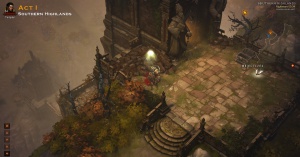
|

|
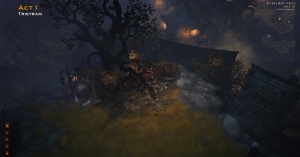
|
| Dungeons | ||
| Khazra Den | Drowned Temple | Tristram Cathedral |

|

|
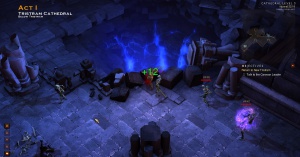
|
| Halls of Agony | Leoric's Manor | Royal Crypts |
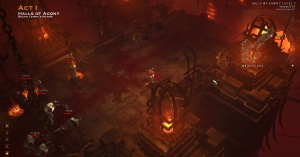
|

|
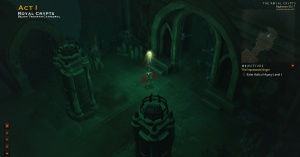
|
Act II - Is largely an arid desert landscape however small parts of it are an oasis. Below the ground you will find sewers and ancient temples. The city is Caldeum and more fighting goes on here than in Act I's Tristram in the city itself and its Palace.
Act III - Is mostly tundra and military structures taking you below ground to strongholds, barracks, and supply stores. Also the famous Arreat Crater which spirals deep into the ground towards Hell. The town, such as it is in this area, is Bastion's Keep, a military stronghold.
Act IV - Is otherwordly and takes you to the High Heavens. No outside areas as you have known them in the previous acts but rather a heavenly palace which eventually turns more hellish the closer to Diablo you get. There is no town in this act.
Variety
Though fans have thus far seen only a few levels, Blizzard promises that there will be lots of them in the final game; as many or more than there were in Diablo II, and with a wide variety of appearances and styles. Bashiok commented on this in July 2009.[1]
Still cool! Caves are still awesome, but you probably don’t want magical purple and green lighting in a cave, it’s probably going to have a much different and subdued feel. If it’s a natural cave it may have light streaming in from cracks above, or if it’s a mine it might have lighting from lanterns. Much earthier and natural. Then you walk into some ancient tomb of a powerful wizard, oh crap, this place clearly has something else going on. The lighting is a bit unnatural, maybe some sickly greenish hues to set a theme and mood.
That type of theming adds a lot to keeping the scenery changing and interesting. If you’re just fighting demons against a grey or brown backdrop for hours and hours, days and days, maybe years and years… it gets boring. Interesting, themed, and contrasting scenery all help ensure visual longevity.
Randomized vs. Pre-designed
Surface areas in Diablo 3 are non-random in their general layout. There are still some randomized elements on the surface; but the general shapes of the levels does not vary from game to game.
Dungeons are a lot more random in their layout adopting more of a bolt-on approach where different segments appear in different configurations. Some smaller dungeons are the same each time such as Leoric's Passage and Crypt of the Ancients for example.
This concept was explained by Diablo 3 Community Manager Bashiok in July 2009. [2]
Players who were able to explore the same areas in multiple games, especially the desert surface areas of Act 2, found the outlines repeating every game, but didn't mind the approach. The borders of levels were always the same, but they were much more interesting in their art design and layout than the largely square, right-angles at the edges of outdoor levels in Diablo 2. There were also a number of chests placed around the outer borders of the Diablo 3 surface levels, rewarding players who explored the entire area.
Contained within the surface areas were numerous sections where semi-random objects appeared; in different games a player might find empty space, a small, ruined town, an NPC with a quest, or a big pack of boss monsters, and this kept the exploration and exploration fun. That said, it remains to be seen how well this non-randomization will hold up long term, once players have raced through the same levels dozens or hundreds of times.
Bashiok threw out another large explanation of this system in April 2011.[3]
Media
| Sanctuary[e] Act 1 Act 2 Act 3 Act 4 Act 5 |
|---|
| Act 1 | [e] | ||||
|---|---|---|---|---|---|
|
Char. Level: 1 - 20 |
Khanduras |
• The Old Ruins (m) | |||
| (X) = Typical character level for that area - (m) = Map of area | |||||
| Act 1 categories: Dungeons Settlements Structures Maps |
|---|
|
Bonus Areas Cemetery of the Forsaken Fields of Misery |
Festering Woods Leoric's Hunting Grounds |
The Old Ruins Old Tristram Road |
[e]
• The Royal Crypts (m) Wortham Southern Highlands |
|
Blank for now. Maps are the small (m)s |
[e] |
| Act 2 | [e] | ||||
|---|---|---|---|---|---|
|
Char. Level: 12 - ? |
Kehjistan |
||||
| (X) = Typical character level for that area | |||||
| Act 2 categories: Dungeons Settlements Structures Maps |
|---|
|
Kehjistan |
[e] |
|
Caldeum |
[e] |
|
Blank for now. Maps are the small (m)s |
[e] |
| Act 3 | [e] | ||||
|---|---|---|---|---|---|
|
Char. Level: ? - ? |
Dreadlands |
|
|
||
| (X) = Typical character level for that area | |||||
| Act 3 categories: Dungeons Settlements Structures Maps |
|---|
| [e] |
|
Bash |
Cleave |
Frenzy |
[e] |
|
Bash |
Cleave |
Frenzy |
[e] |
|
Bash |
Cleave |
Frenzy |
[e] |
| Act 4 | [e] | ||||
|---|---|---|---|---|---|
|
Char. Level: ? - ? |
' |
| |||
| (X) = Typical character level for that area | |||||
| Act 4 categories: Dungeons Settlements Structures Maps |
|---|
|
Bash |
Cleave |
Frenzy |
[e] |
|
Bash |
Cleave |
Frenzy |
[e] |
|
Bash |
Cleave |
Frenzy |
[e] |
|
Bash |
Cleave |
Frenzy |
[e] |
| Act 5 | [e] | ||||
|---|---|---|---|---|---|
|
Char. Level: 60 - ? |
Khanduras |
||||
| (X) = Typical character level for that area | |||||